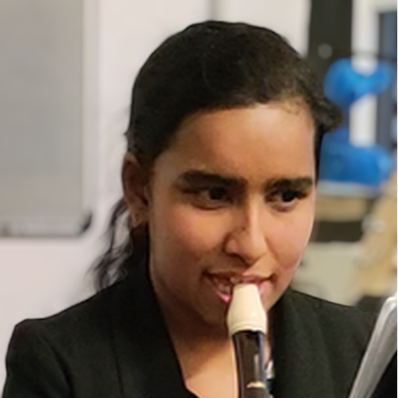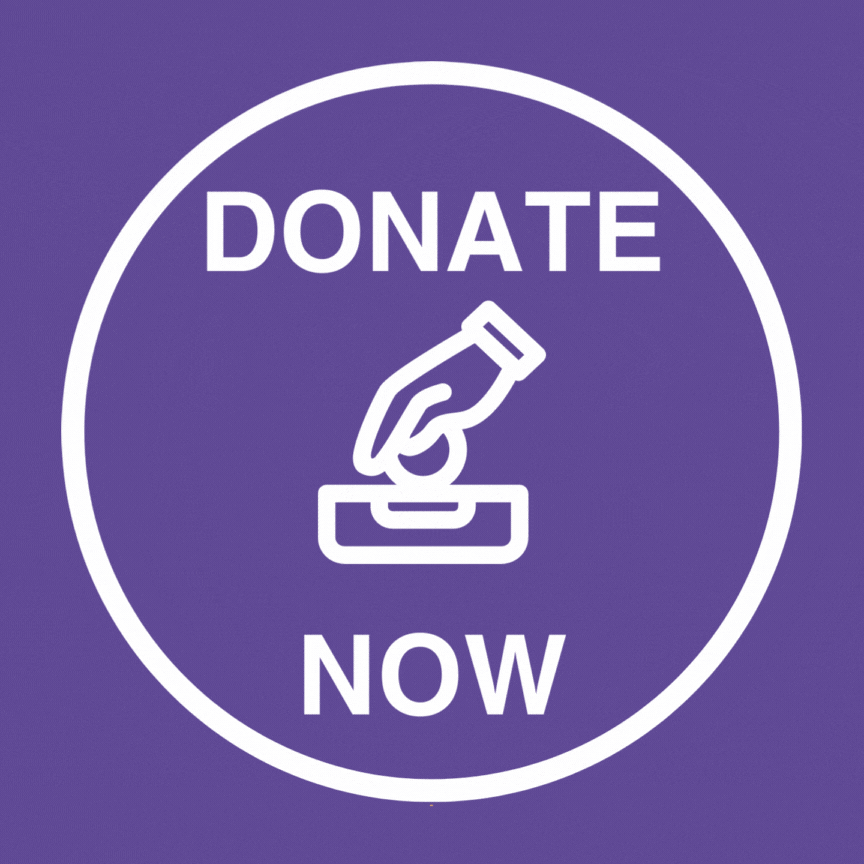Case study: How the one-handed recorder is helping to spread the magic of Disney!The story of Samiya
|
Samiya is one of OHMI’s most established musicians. From taking up the recorder at the age of 10, she can count many accomplishments, including playing in ensembles and orchestras, winning Arts Award Discover Bronze and Silver Awards, and mastering ‘A Whole New World’ and many other Disney songs!
Samiya tells us why the opportunity to make music is so important.
“When I was in Year 3, I had the opportunity at my school to play the trumpet as part of whole class teaching. The charity Remap made me a trumpet rest so that I could play the instrument with one hand but I wasn’t able to stand easily during the performance, as was expected by my teachers, and that affected my ability to play and to enjoy doing so.
I was first introduced to OHMI when the Physical Disability Support Service in Birmingham put me forward as a suitable candidate for OHMI’s Teaching Pilot which offered support in lessons for students that use adapted instruments or equipment. That’s when I was given my one-handed recorder. The recorder was the first instrument I played at school so I felt very comfortable playing it. I really enjoy playing Disney songs (with my all-time favourite being ‘A Whole New World’ from the musical Aladdin), and there are so many tutorials on YouTube that I find the music really easy to learn.
It was the team at OHMI who told me about the ensembles and orchestras I could join. Over the years, I’ve been part of several ensembles in Birmingham, including OHMI ensemble days, the Birmingham Services for Education ensemble, and the National Orchestras for All programme. Being part of something has been really important to me, and I’ve been lucky that OHMI has been there to help address my needs.
It’s really important that I make others aware that there is help out there. Now that I’ve reached adulthood, I’m no longer under the Birmingham Children's Hospital but I’ve volunteered my services as one of its youth ambassadors so I can help capture feedback on what the children need and how support services can be improved. I always tell them and their families about OHMI and, after undertaking a stock take of the OHMI Instrument Hire scheme kit as part of last summer’s work experience, I feel I know more about what’s available beyond the one-handed recorder!
My advice to any other child in my position who is thinking of taking up an instrument would be just to do it! Playing a musical instrument helps you learn skills beyond the music-making itself, including transferable skills such as team working. It also means you get to do really fun stuff outside of school life!”
Samiya’s mum Shiwli adds,
“Samiya never really liked sport and doesn’t have great balance because of her condition. OHMI gave Samiya an opportunity to venture out and get involved in extracurricular activity, and playing in an orchestra has really helped build her self-esteem and show her that there are other children with a disability like hers who are in a similar situation.
That feeling of inclusivity is so important. A disabled child in a mainstream school will always miss out if the teaching staff are uninformed about their needs. There’s a particular instance that sticks out for me when Samiya was scolded by a teaching assistant for not standing up at the end-of-term musical performance. Her balance issues and the weight of the trumpet, as well as balancing the trumpet stand on a knee, would have made this almost impossible to do! Sadly, Samiya was asked to stand at the back and didn’t get to participate as a result. That may be one of the reasons why she loves ensembles and orchestras so much now – that feeling of being part of a much bigger group and sound.
A lot has improved in terms of awareness of disabled children’s needs within the school environment and in making reasonable adjustments, both there’s still lots to do. OHMI’s work in helping to educate teaching staff to go the extra mile for budding musicians who live with a disability is still so important and is hugely appreciated.”
“When I was in Year 3, I had the opportunity at my school to play the trumpet as part of whole class teaching. The charity Remap made me a trumpet rest so that I could play the instrument with one hand but I wasn’t able to stand easily during the performance, as was expected by my teachers, and that affected my ability to play and to enjoy doing so.
I was first introduced to OHMI when the Physical Disability Support Service in Birmingham put me forward as a suitable candidate for OHMI’s Teaching Pilot which offered support in lessons for students that use adapted instruments or equipment. That’s when I was given my one-handed recorder. The recorder was the first instrument I played at school so I felt very comfortable playing it. I really enjoy playing Disney songs (with my all-time favourite being ‘A Whole New World’ from the musical Aladdin), and there are so many tutorials on YouTube that I find the music really easy to learn.
It was the team at OHMI who told me about the ensembles and orchestras I could join. Over the years, I’ve been part of several ensembles in Birmingham, including OHMI ensemble days, the Birmingham Services for Education ensemble, and the National Orchestras for All programme. Being part of something has been really important to me, and I’ve been lucky that OHMI has been there to help address my needs.
It’s really important that I make others aware that there is help out there. Now that I’ve reached adulthood, I’m no longer under the Birmingham Children's Hospital but I’ve volunteered my services as one of its youth ambassadors so I can help capture feedback on what the children need and how support services can be improved. I always tell them and their families about OHMI and, after undertaking a stock take of the OHMI Instrument Hire scheme kit as part of last summer’s work experience, I feel I know more about what’s available beyond the one-handed recorder!
My advice to any other child in my position who is thinking of taking up an instrument would be just to do it! Playing a musical instrument helps you learn skills beyond the music-making itself, including transferable skills such as team working. It also means you get to do really fun stuff outside of school life!”
Samiya’s mum Shiwli adds,
“Samiya never really liked sport and doesn’t have great balance because of her condition. OHMI gave Samiya an opportunity to venture out and get involved in extracurricular activity, and playing in an orchestra has really helped build her self-esteem and show her that there are other children with a disability like hers who are in a similar situation.
That feeling of inclusivity is so important. A disabled child in a mainstream school will always miss out if the teaching staff are uninformed about their needs. There’s a particular instance that sticks out for me when Samiya was scolded by a teaching assistant for not standing up at the end-of-term musical performance. Her balance issues and the weight of the trumpet, as well as balancing the trumpet stand on a knee, would have made this almost impossible to do! Sadly, Samiya was asked to stand at the back and didn’t get to participate as a result. That may be one of the reasons why she loves ensembles and orchestras so much now – that feeling of being part of a much bigger group and sound.
A lot has improved in terms of awareness of disabled children’s needs within the school environment and in making reasonable adjustments, both there’s still lots to do. OHMI’s work in helping to educate teaching staff to go the extra mile for budding musicians who live with a disability is still so important and is hugely appreciated.”
"OHMI gave Samiya an opportunity to venture out and get involved in extracurricular activity, and playing in an orchestra has really helped build her self-esteem and show her that there are other children with a disability like hers who are in a similar situation."
Donate to OHMIThere are so many disabled people who are desperate to play music with their peers. We can help to make that happen – but we can only do that with the wonderful support of our funders and donors.
As our instruments have to be hand-made by experts, they can only be produced in small numbers and are therefore expensive. Every little really does help.
|
Contact usIf you have a query or wish to contact us, please use the contact form available here.
You can also write to us: The OHMI Trust, 29 Woodbourne Road, Harborne, Birmingham B17 8BY |
Subscribe to our NewsletterIf you would like to join our mailing list and keep up to date with the latest news, please complete the form available here.
|
Privacy and Cookies Notice | Complaints Policy
All content © OHMI - Enabling Music-Making for Physically Disabled People
The OHMI Trust is a registered charity (Registered in England and Wales Charity No. 1143623, Scotland Charity No. SC052047).
Registered office: 29 Woodbourne Road, Harborne, Birmingham, B17 8BY
All content © OHMI - Enabling Music-Making for Physically Disabled People
The OHMI Trust is a registered charity (Registered in England and Wales Charity No. 1143623, Scotland Charity No. SC052047).
Registered office: 29 Woodbourne Road, Harborne, Birmingham, B17 8BY





